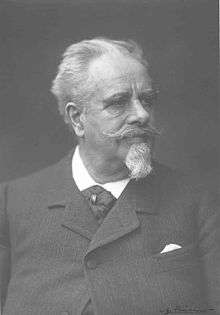Adolph von La Valette-St. George
Adolph von La Valette-St. George (14 November 1831 in Schloss Auel – 29 November 1910 in Bonn) was a German zoologist and anatomist, known for his research in developmental biology.

He studied at the universities of Berlin, Munich and Würzburg, where he was a student of Albert von Kölliker. In 1855 he obtained his PhD with the thesis "Symbolae ad Trematodum evolutionis historiam",[1] then in 1857 received his medical doctorate. In 1858 he qualified as a lecturer at the University of Bonn, where in 1862 he became an associate professor.[2] In 1875, he was named a full professor and successor to Max Schultze as director of the anatomical institute at Bonn.[3]
He is credited with coining the terms spermatocyte (1876), spermatogonium (1876) and spermatid (1886).[4] Some sources mention La Valette-St. George as the first to observe what would later be known as the Golgi apparatus (1865, 1867), a structure that he reportedly described in the sexual cells of snails.[5][6][7]
Published works
With Heinrich Wilhelm Gottfried von Waldeyer-Hartz (from 1874) and Oscar Hertwig (from 1889), he was co-editor of the journal "Archiv für mikroskopische Anatomie".[8][2] The following are a list of some of his noted scientific works:
- Entwicklung der Trematoden, 1859 – Development of trematodes.
- Studien über die Entwicklung der Amphipoden, 1860 – Studies on the development of amphipods.
- Ueber die Entwicklung der Isopoden, 1864 – On the development of isopods.
- Ueber eine neue Art amöboider Zellen, 1865 – On a new kind of amoeboid cell.
- Ueber die Genese der Samenkörper, 1865 – On the genesis of spermatic bodies.
- Ueber den Keimfleck und die Deutung der Eitheile, 1866 – On the germinal spot and the construction of egg components.
- Entwicklung der Samenkörper beim Frosch, 1868 – Development of the spermatic bodies in frogs.
- Ueber einen neuen Fischbrutapparat, 1882 – On a new fish brooder.
- Zelltheilung und Samenbildung bei Forficula auricularia, 1887 – Cell division and spermatogenesis of Forficula auricularia.
- Ueber innere Zwitterbildung beim Flusskrebs, 1892 – On inner hermaphroditism in crayfish.
- Zwitterbildung beim kleinen Wassermolch, 1895 – Hermaphroditism in small newts.
- Zur Samen- und Eibildung beim Seidenspinner (Bombyx mori), 1897 – Sperm and egg formation in silkworms (Bombyx mori).
- Die Spermatogenese bei den Säugethieren und dem Menschen, 1898 – Spermatogenesis of quadrupeds and humans.[2]
References
- Symbolae ad trematodum evolutionis historiam HathiTrust Digital Library
- La Valette St. George, Adolph Freiherr von Pagel: Biographisches Lexikon hervorragender Ärzte des neunzehnten Jahrhunderts. Berlin, Wien 1901, Sp. 966-967.
- Studies from the Dept. of Anatomy, University of Illinois College ..., Volume 3 by University of Illinois (Urbana-Champaign campus). College of Medicine. Dept. of Anatomy
- The Cell in development and inheritance by Edmund Beecher Wilson
- Eminent Neuroscientists Their Lives and Works by Kalyan B Bhattacharyya
- The Golgi Apparatus edited by Eric Berger, J. Roth
- The Golgi Apparatus: The First 100 Years by James Morré, Hilton H. Mollenhauer
- Archiv für mikroskopische Anatomie HathiTrust Digital Library